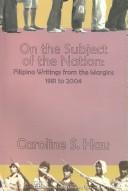| Listing 1 - 9 of 9 |
Sort by
|
Book
ISBN: 9789971697921 9784876983605 4876983607 9971697920 4876983607 Year: 2014 Publisher: Singapore NUS Press
Abstract | Keywords | Export | Availability | Bookmark
 Loading...
Loading...Choose an application
- Reference Manager
- EndNote
- RefWorks (Direct export to RefWorks)
As the meanings of "Chinese" and "Filipino" evolve, intractable contradictions are appearing in the concepts of citizenship and national belonging. Through an examination of cinematic and literary works, The Chinese Question shows how race, class, ideology, nationality, territory, sovereignty, and mobility are shaping the discourses of national integration, regional identification, and global cosmopolitanism
Sociology of culture --- Ethnology. Cultural anthropology --- Philippines --- Chinese in motion pictures --- Philippine literature --- Chinese --- National characteristics, Chinese

ISBN: 9789715504713 971550471X Year: 2004 Publisher: Quezon City: Ateneo de Manila University Press,
Abstract | Keywords | Export | Availability | Bookmark
 Loading...
Loading...Choose an application
- Reference Manager
- EndNote
- RefWorks (Direct export to RefWorks)
Book
ISBN: 9789971695477 Year: 2011 Publisher: Singapore NUS Press
Abstract | Keywords | Export | Availability | Bookmark
 Loading...
Loading...Choose an application
- Reference Manager
- EndNote
- RefWorks (Direct export to RefWorks)
Book
ISBN: 9781478019312 9781478016687 Year: 2022 Publisher: Durham : Duke University Press,
Abstract | Keywords | Export | Availability | Bookmark
 Loading...
Loading...Choose an application
- Reference Manager
- EndNote
- RefWorks (Direct export to RefWorks)
"The contributors to Siting Postcoloniality reevaluate the notion of the postcolonial by focusing on the Sinosphere-the region of East and Southeast Asia that has been significantly shaped by relations with China throughout history. Pointing out that the history of imperialism in China and Southeast Asia is longer and more complex than Euro-American imperialism, the contributors complicate the traditional postcolonial binaries of center/periphery, colonizer/colonized, and developed/developing. Among other topics, they examine socialist China's attempts to break with Soviet cultural hegemony, the postcoloniality of Taiwan as it negotiates the legacy of Japanese colonial rule, Southeast Asian and South Asian diasporic experiences of colonialism, and Hong Kong's complex colonial experiences under the British, the Japanese, and mainland China. The contributors show how postcolonial theory's central concepts cannot adequately explain colonialism in the Sinosphere. Challenging fundamental axioms of postcolonial studies, the volume forcefully suggests that postcolonial theory needs to be rethought. Contributors. Pheng Cheah, Dai Jinhua, Caroline S. Hau, Elaine Yee Lin Ho, Wendy Larson, Liao Ping-hui, Lin Pei-yin, Lo Kwai-Cheung, Lui Tai-lok, Pang Laikwan, Lisa Rofel, David Wang, Erebus Wong, Robert J. C. Young"--
Postcolonialism --- Postcolonialism --- Postcolonialism --- China --- Southeast Asia --- China --- East Asia --- Relations --- Relations --- Relations --- Relations
Book
ISBN: 1478023953 9781478023951 Year: 2023 Publisher: Durham Duke University Press
Abstract | Keywords | Export | Availability | Bookmark
 Loading...
Loading...Choose an application
- Reference Manager
- EndNote
- RefWorks (Direct export to RefWorks)
"The contributors to Siting Postcoloniality reevaluate the notion of the postcolonial by focusing on the Sinosphere-the region of East and Southeast Asia that has been significantly shaped by relations with China throughout history. Pointing out that the history of imperialism in China and Southeast Asia is longer and more complex than Euro-American imperialism, the contributors complicate the traditional postcolonial binaries of center/periphery, colonizer/colonized, and developed/developing. Among other topics, they examine socialist China's attempts to break with Soviet cultural hegemony, the postcoloniality of Taiwan as it negotiates the legacy of Japanese colonial rule, Southeast Asian and South Asian diasporic experiences of colonialism, and Hong Kong's complex colonial experiences under the British, the Japanese, and mainland China. The contributors show how postcolonial theory's central concepts cannot adequately explain colonialism in the Sinosphere. Challenging fundamental axioms of postcolonial studies, the volume forcefully suggests that postcolonial theory needs to be rethought. Contributors. Pheng Cheah, Dai Jinhua, Caroline S. Hau, Elaine Yee Lin Ho, Wendy Larson, Liao Ping-hui, Lin Pei-yin, Lo Kwai-Cheung, Lui Tai-lok, Pang Laikwan, Lisa Rofel, David Wang, Erebus Wong, Robert J. C. Young."--
Postcolonialism --- China --- Southeast Asia --- East Asia --- Relations
Digital

ISBN: 9789812305503 9789812303202 Year: 2005 Publisher: Singapore ISEAS Publishing
Abstract | Keywords | Export | Availability | Bookmark
 Loading...
Loading...Choose an application
- Reference Manager
- EndNote
- RefWorks (Direct export to RefWorks)
Digital

ISBN: 9781501718878 Year: 2018 Publisher: Ithaca, N.Y. Cornell University Press
Abstract | Keywords | Export | Availability | Bookmark
 Loading...
Loading...Choose an application
- Reference Manager
- EndNote
- RefWorks (Direct export to RefWorks)
Book

ISBN: 9781501718946 Year: 2018 Publisher: Ithaca, NY
Abstract | Keywords | Export | Availability | Bookmark
 Loading...
Loading...Choose an application
- Reference Manager
- EndNote
- RefWorks (Direct export to RefWorks)
Digital

ISBN: 9781501718946 Year: 2018 Publisher: Ithaca, N.Y. Cornell University Press
Abstract | Keywords | Export | Availability | Bookmark
 Loading...
Loading...Choose an application
- Reference Manager
- EndNote
- RefWorks (Direct export to RefWorks)
| Listing 1 - 9 of 9 |
Sort by
|

 Search
Search Feedback
Feedback About UniCat
About UniCat  Help
Help News
News